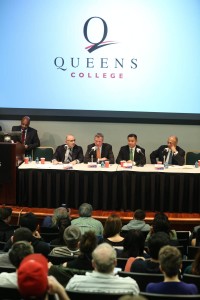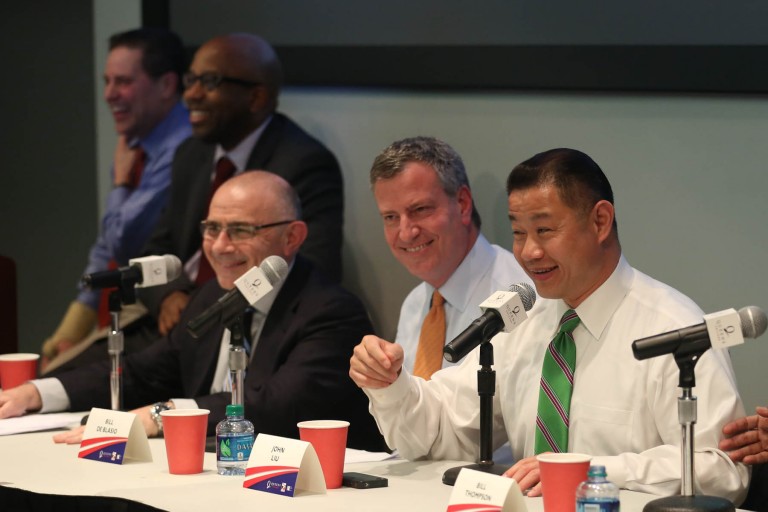The four Democratic mayoral candidates at a Queens College debate last week made plenty of statements that garnered them applause from the more than 200 people packed into the Rosenthal Library, but it may have been Public Advocate Bill de Blasio who incited the loudest burst of laughter – and even a couple cheers.
“There’s a profound evil facing New York City – and it is the Long Island Expressway,” de Blasio joked after traffic caused him to arrive late to last Thursday’s debate, during which he, City Comptroller John Liu, former Councilman Sal Albanese and former City Comptroller Bill Thompson traded views – and, once in a while, barbs – on everything from stop and frisk to assistance for those affected by Hurricane Sandy and education.

Photo Courtesy of Dominick Totino Photography. Pictured from left to right are Errol Louis, host of NY-1’s “Road to City Hall”; candidates Sal Albanese, Bill de Blasio John Liu and Bill Thompson.
Council Speaker Christine Quinn (D-Manhattan), the current front-runner for Mayor Michael Bloomberg’s seat, was also scheduled to be at the debate at the Flushing college but did not attend. Her campaign did not respond to a question from this newspaper as to why she was not there.
When asked by the debate’s moderators – Queens College Political Science Professor Michael Krasner and Errol Louis, host of NY1’s “Road to City Hall” – about the New York Police Department’s controversial stop-and-frisk program that Bloomberg and Kelly have hailed as necessary to reduce crime and remove guns from the street, but which critics have said unfairly target minorities and do not yield high rates of confiscated weapons, three of the candidates – Liu, de Blasio and Thompson – agreed they would ax Police Commissioner Ray Kelly, in part because he has overseen an increase in the number of people stopped and frisked.
Stop-and-frisk incidents have increased from 97,296 stops in 2002 to 685,724 stops in 2011 – and black and Latino New Yorkers made up close to 90 percent of those stopped between 2002 and 2011, according to the New York Civil Liberties Union. The NYPD seized 780 guns with 685,724 stop-and-frisks – compared to 604 guns during 160,851 stops in 2003, according to the NYCLU.
Albanese, who represented southwestern Brooklyn while serving in the Council for four terms until 1997, said it would be “irresponsible” to say whether or not he would replace Kelly. While Quinn was not at the debate, she said at debate in March that she would retain Kelly as commissioner.
“Stop-and-frisk has created such deep divisions between the community and the police,” said Liu, who represented Flushing in the Council before becoming comptroller. “The police are having a more difficult time doing their job, and I think stop-and-frisk makes communities less safe in the city of New York.”
While Liu said the stop-and-frisk program should be eliminated, Thompson said he would look to amend, not ax, it.
Saying people who are black and Hispanic are “targeted in the stop-and-frisk program,” Thompson argued the city needs “a commissioner who understands stop-and-frisk should not be used in the way it has been used.”
De Blasio said he supported the creation of an inspector general for the NYPD – a proposal expected to soon be voted on, and passed, by the Council. Bloomberg has vowed to veto such a bill, but Quinn has said the Council would override such a move.
“We need an inspector general for the police department to make sure this never happens again,” de Blasio said in reference to issues with the stop-and-frisk program. “… You need a new mayor resolved to respect civil liberties and heal the divide between police and community while still keeping us safe.”
While Albanese did not say whether or not he would replace Kelly, he did agree with Thompson that the stop-and-frisk program should be changed – but not entirely eliminated.
“We need to keep it, but focus on quality stops, not quotas,” he said. “We need to invest in training, so officers know the constitutionality of stopping and frisking someone.”
Albanese also said he aims to hire additional police officers and disagreed with a plan to hire an inspector general.
The four candidates also addressed the response of the city during Hurricane Sandy, as well as the needs of those still dealing with the fallout from the tropical cyclone.
“The Rockaways have been devastated, and City Hall has not paid attention to what’s going on there,” Liu said. “There are thousands of families who are trying to put their lives back together – we need to provide greater assistance at the city level.”
Albanese lambasted the city for not better preparing for Sandy.
“We have a reactive government… it was a dismal failure of planning by the city for the last 10 years,” he said. “Of course now we’re in crisis mode.”
The former Brooklyn councilman also called for a task force to be set up in each borough that would connect residents with government officials who could help them on everything from insurance questions to health concerns.
Criticizing the city government for its response after the hurricane, de Blasio said he “went out to Howard Beach about 10 days after the storm with teams of people going door to door to homeowners, and the vast majority of people we met said they had not heard anything from the government or hadn’t gotten answers.
“Months later, we heard the same thing,” he continued.
Thompson too said the response from the city was far from adequate following Sandy.
“The people of the Rockaways did a great job helping each other, but they asked where’s the city of New York; where’s the mayor of the city of New York?” Thompson said. “‘He’s not here.’”
On the topic of public education, the candidates, once again, criticized Bloomberg – who took control of the schools when the state Legislature passed mayoral control in 2002. None of the candidates said they would do away with mayoral control, which allowed Bloomberg to replace the Board of Education with the Panel for Educational Policy, though they did say they would look to grant more power to parents and teachers. Because the mayor appoints the majority of the members to the PEP, which votes on such issues as school closures, critics of mayoral control have said Bloomberg has been able to sidestep concerns voiced by Community Education Councils and other school leaders.
“For the last 14 years, I’ve been a New York City public school parent,” de Blasio said. “When Bloomberg came into office, you saw signs that could’ve been hopeful… I thought mayoral control of education could be a good thing.”
Instead, de Blasio said the city Department of Education became an “isolated” group of people who “got in the habit of ignoring the voices of parents.”
De Blasio, Thompson and Liu all slammed the city’s emphasis on standardized testing.
“It’s important we get away from this focus on standardized testing,” said Thompson, the former president of the Board of Education. “We need to include things back into a public school system that have been taken out – like art and physical education.”
Liu said the city has to “stop treating public schools like business divisions reporting to the Department of Education corporation.” Albanese, a who taught in the New York City public school system for 11 years, and Thompson both said there need to be smaller class sizes, and Albanese and de Blasio said there needs to resources funneled into early intervention programs.
Additionally, Albanese said he would increase training for teachers while they are in school.
By Anna Gustafson

